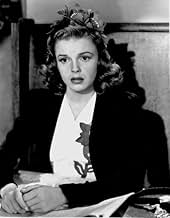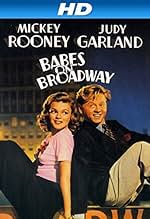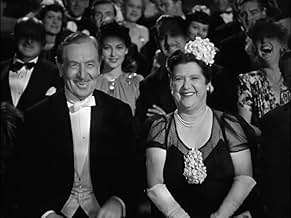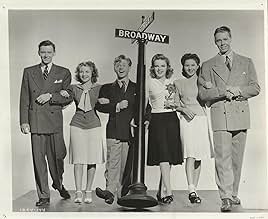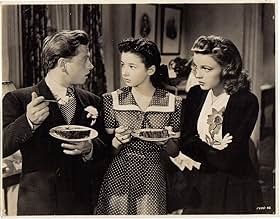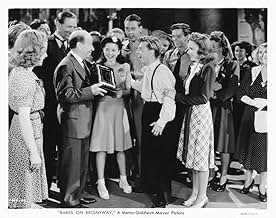Ajouter une intrigue dans votre languePenny Morris and Tommy Williams are both starstruck young teens but nobody seems to give them any chance to perform. Instead, they decide to put up their own show to collect money for a summ... Tout lirePenny Morris and Tommy Williams are both starstruck young teens but nobody seems to give them any chance to perform. Instead, they decide to put up their own show to collect money for a summer camp for the kids.Penny Morris and Tommy Williams are both starstruck young teens but nobody seems to give them any chance to perform. Instead, they decide to put up their own show to collect money for a summer camp for the kids.
- Réalisation
- Scénario
- Casting principal
- Nommé pour 1 Oscar
- 1 nomination au total
- Man
- (scènes coupées)
- Elinor Downing, War Refugee
- (non crédité)
- Butch
- (non crédité)
- Mrs. Crainen, the Matron
- (non crédité)
Avis à la une
What seems to get the most reaction here on IMDb is not surprisingly the minstrel number at the close of the show with all of the actors in blackface. Yes it's dated and offensive but some of the comments here are way over the top. One imbecilic individual even said Mickey Rooney shouldn't have been allowed to work again! Put the Kool-Aid down, kid.
Mickey is a member of a trio which also consists of Ray McDonald and Richard Quine singing for their supper at a one armed spaghetti joint owned by Luis Alberni. One of the three customers in the joint one night is Broadway girl Friday, Fay Bainter who loves the act and Mickey especially. She spends the rest of the film trying to get ulcer ridden producer James Gleason to hear him and the rest of the talent Rooney collects for that inevitable show he wants to put on.
Of course one of those talents is Judy Garland, another eager young hopeful and the musical highlight of the film is their singing the famous Vernon Duke song, How About You. It's not one of Berkeley's big production numbers, it's done with Mickey and Judy at a piano in her place, but their infectious enthusiasm will grab you immediately. How About You was later done in the fifties with a really fine arrangement by Rosemary Clooney and Bing Crosby in one of their joint albums.
The other highlight for me is the surreal number done when Judy and Mickey arrive at a long closed theater for their show and are transformed by the spirits of the performers of long ago who headlined in the place. What has to be remembered is that several of these people were actually still alive when Mickey and Judy are imitating them, people like George M. Cohan, Harry Lauder, Blanche Ring. Faye Templeton, Sarah Bernhardt, and Richard Mansfield were long dead or retired by then. Still people in the audience remembered them and Mickey and Judy's reverential treatment to these stage stars of long ago must have struck a chord in movie audiences we can't appreciate today.
The minstrel show finale of course isn't good, yet even that is salvaged somewhat by Judy's singing of Franklin D. Roosevelt Jones. She also recorded it for Decca and the number still plays well today. When Judy does it even in blackface, somehow instead of degrading, it comes out as a tribute, like Fred Astaire in blackface imitating Bill Robinson in Bojangles of Harlem.
My favorite of their joint projects has always been Girl Crazy, still Mickey and Judy are as alive and fresh in Babes on Broadway as ever and it's a great example of matchless chemistry and teamwork.
Several talented young people, just starting out, try to make it big on Broadway. That's the story premise. The script presents a thin, superficial plot. Dialogue lacks significant subtext. But, of course, the plot's real purpose is to create continuity in a film meant to showcase the musical talents of its two big stars: Mickey Rooney and Judy Garland. They, along with a large cast, sing and dance in various musical productions, some good, some not so good.
Which leads to my main criticism of this film: the editing. With a thin plot and a runtime of two hours, large chunks could have been chopped out. I have no idea why they included a Beethoven piano performance by a child prodigy; it has no connection to anything. Similarly, the "Hoe Down" musical segment is arguably weak. And, though I commend the producers for acknowledging Great Britain's War efforts, devoted plot elements are thematically irrelevant and overly long.
On the other hand, the best sequence in the film is its grand musical finale, a tribute to the American South. This segment provides a nice contrast to New York's Broadway allure. Dialogue here refers to an "old-fashioned" minstrel show. Most of the songs are from decades earlier. Musical lyrics include the wording "And boy that Southern cooking is okay". Clearly, the intent is to salute the South. So putting performers in black face is entirely appropriate within the well-defined historical context.
Performances are fine. Judy Garland shines. Fay Bainter, ideally cast as a theatrical agent, also gives a good performance. At various points Ray McDonald excels as a tap dancer; he's almost in the same league as Fred Astaire. And impersonating "Brazil bombshell" Carmen Miranda, Mickey Rooney is funny in drag, wearing platform shoes, tawdry women's jewelry, and a flamboyant hat as he sings Miranda's signature song "Mamae Eu Quero". Throughout the film Rooney exudes confidence, energy, and a highly animated persona.
The film's sets and costumes, dialogue about tough times, as well as the selected music and the big accent on tap dancing, combine to give viewers a pretty good feel for American pop culture in the early 1940s. It's by no means a perfect film. But it's worth watching, mostly for nostalgia, as representative of an era that is gone forever.
Le saviez-vous
- AnecdotesVincente Minnelli conceived and supervised the "Ghost Theater" sequence where Garland and Rooney imitate theatrical notables of the past.
- GaffesWhen Alexander Woollcott is introducing the story, at one point his bow tie disappears and his collar is open.
- Citations
Maxine, Little Girl at Audition: Please wait, don't send my brother to the chair, don't let him burn, please, please warden, please.
- Versions alternativesSome older television prints of the film delete the minstrel show finale.
- ConnexionsEdited into Hollywood: The Dream Factory (1972)
- Bandes originalesBabes on Broadway
(uncredited)
Music by Burton Lane
Lyrics by E.Y. Harburg
Played and sung by a chorus during the opening credits
Reprised as a production number with the principal cast near the end
Sung and danced to by Judy Garland and Mickey Rooney in blackface
Danced to by Ray McDonald in blackface
Meilleurs choix
- How long is Babes on Broadway?Alimenté par Alexa
Détails
Box-office
- Budget
- 940 068 $US (estimé)
- Durée1 heure 58 minutes
- Couleur
- Rapport de forme
- 1.37 : 1
Contribuer à cette page



